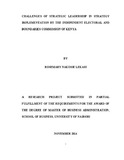| dc.description.abstract | This research project was set out to address the objective of determining the challenges of
strategic leadership in strategy implementation by the IEBC in Kenya. The study was
carried out through case study focusing on the Independent Electoral and Boundaries
Commission (IEBC) in Kenya. Primary data was collected from the respondents through
interview guides and key informant interviews. A total of 16 respondents were targeted to
be interviewed using interview guides as follows 3 Commissioners, 3 Directors, 5
managers, 5 Assistant managers/Coordinators out of which, 15 responded and 1 (one) did
not respond. Secondary data from respondent organization, reports and past strategic
plans was used to verify and validate the primary data. The data collected was analyzed
using content analysis results presented analyzed to give information pertaining to the
study objective. Research findings revealed that at IEBC strategic leadership is critical in
addressing not only every day issues of the organization but also instrumental in
directioning, resourcing and influence strategic performance of the IEBC. It also brought
forth several challenges facing IEBC in the process of strategy implementation. These
challenges included limited resources, management of diversity among staff, political
interests and interference, voter registration and education, people’s perception that IEBC
was incompetent, suspicion in management of electoral results, wide mandate covering
the entire aspects of electoral process and delimitation of boundaries across the country
and negative publicity. In mitigating the challenges, IEBC had adopted various strategies
including strategies that had been adopted to mitigate the challenges included civic
education among its staff and the general public to create awareness and enhance rights
of the citizenry; carry out critical electoral systems reforms, enhance the communication
strategy, management of public expectations, realistic costing of projects, dialogue,
enhance capacity building and trainings of staff, eliminate bureaucracy, embrace proper
planning, build strong corporate culture at IEBC, enhance job descriptions, clearly spell
out roles and responsibility of each office and integration/synergy of departments to
deliver as a single entity. The research recommends that IEBC takes strategic leadership
in planning and implementation seriously and focus the entire team of staff towards
attainment of the strategic objectives. The commission should carry out regular scanning
of the environment to equip itself with the current trends in electoral process, use
appropriate technology to deliver its mandate and enforce a code of conduct and ethics to
be followed by staff and commissioners, employ some of the strategic management tools
like balance score card, performance contracting and ISO standards for effective
performance management which is linked with individual performance. This had the
possibility to further reduce mistrust, suspicions and lack of coordination of the team
leading to enhanced organizational output. The research findings therefore addressed the
question under investigation and would be practical to the practitioners of strategic
leadership and management and especially at IEBC in the provision and implementation
of the strategic leadership. | en_US |

